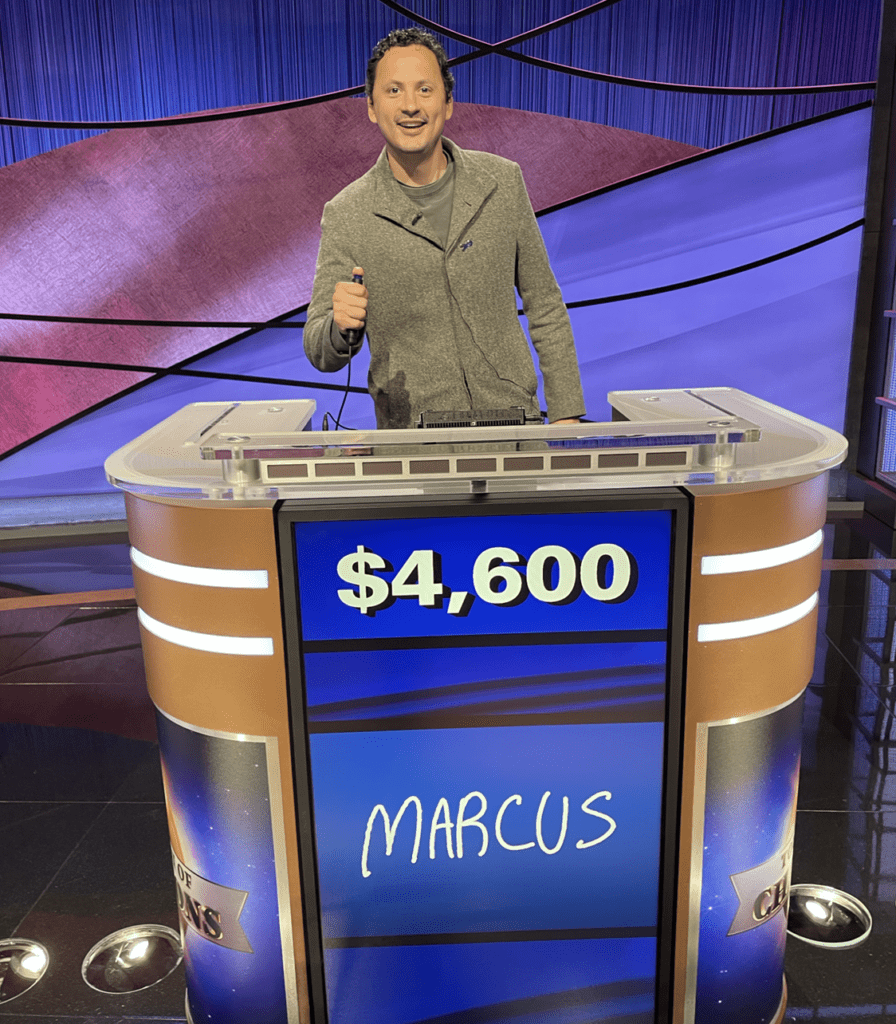Two Emerson Alums Clue Us in About ‘Jeopardy!’

The answer is: These two Emerson College alums work for Jeopardy!
[Ding ding] Who are Marcus Brown ’11 and Michael Harris ’87?
Marcus Brown had worked for other game shows as a researcher, but jumped at the opportunity to work for Jeopardy!. He started as a researcher, and became a staff writer of the classic game show earlier this year.
Brown learned about the job opening at Jeopardy! from Michael R. Harris, a senior researcher, game play analyst, and frequent contributor to the Jeopardy! podcast, The Enabler.
Harris’ on-set nickname is “The Enabler” because he operates the enabling button on game days. Once Harris clicks the button, blue lights go on around the game board letting players know they can buzz in. When a player buzzes in, red lights light up their podium, letting them know how long they have to answer, and if they’re wrong, Harris must be Johnny-on-the-spot to reenable the enabling button so the other contestants can buzz in.
“I consider myself to be the fourth player in a way,” said Harris. “I have to be just as engaged in the game as they are, and they’re all anticipating me. I’m listening closely to [the hosts] Ken [Jennings] or Mayim [Bialik].”
The players answer clues written by Brown and the other staff writers. Brown said writers get free rein in creating clue categories.
“We want to be as diverse as possible, going from history to science to word play, to pop culture, entertainment…,” said Brown. “Throughout the week I try to do as many categories as possible on every topic under the sun. It’s pretty fun, there’s a lot of research and looking up cool facts. We’re trying to find clever and interesting ways to present clues. We don’t want to trick people. We want it to be challenging.”
Brown said some of his recent favorite categories include Hip Hop Literary References; Gold Panning; and one about New Orleans music that musicians reacted to on social media and led to nola.com posting an article about it.
After Brown and the other writers create answers and questions, Harris and the other senior researchers make sure they’re correct.
“I’ll slap Marcus on the wrist if he messes up,” joked Harris.
Harris said the internet doesn’t make things easy because there is so much incorrect information. They try to use stronger sources like news sites, educational sites, museum websites, authors’ sites, or make phone calls to verify information.
“Dates are always tricky because people will quantify things differently or get it wrong. Most people don’t have to have their work checked on the internet,” said Harris. “If you write an article about Alexander Hamilton, it’s rare that someone is going to have it fact checked.”
There’s also a sizable research library in the show’s studio.
Brown finds inspiration to write questions and answers in all types of places.
“Once your mind kind of gets in tune for what to look for, you’re like, oh this could be used on the show, or that could be used on the show,” said Brown.
Both Brown and Harris worked with the late great Jeopardy! host Alex Trebek. When Brown was a researcher, his office was next to where people congregated in the morning. The team would review what was to be shot that day.
“Alex would be there and hold court. He was a social guy and talking about this and that and the other thing,” said Brown. “He congratulated me when I got married. He was a really great guy.”
And even after Trebek received his terminal diagnosis, he continued to be the star.
“Seeing him come in every day, no matter the pain, and on stage he’d be a complete entertainer,” said Brown. “He presented himself so well no matter how much pain he was in.”
Harris said Trebek was “super special” and a great gentleman,” and obviously a great host.
“We miss him a lot,” said Harris.
Categories